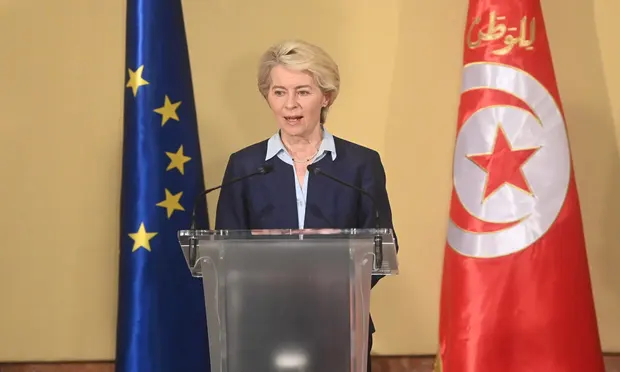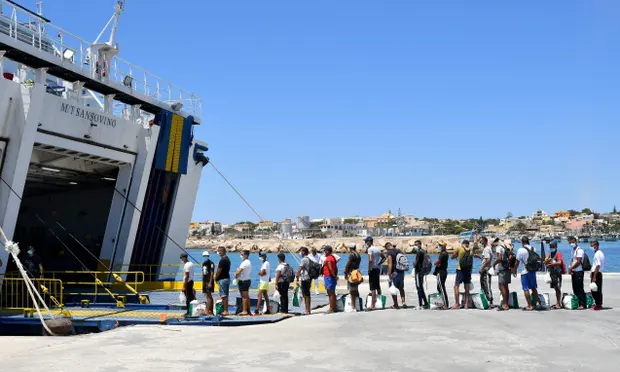EU signs off €1bn deal with Tunisia to help

An EU deal worth €1bn (£860m) has been approved with Tunisia to stem irregular migration, as the country’s president denounced those who offer migrants “sympathy without respect” for their goals.
As an investment in shared prosperity and stability, European Commission President Ursula von der Leyen praised the deal with Tunisia, which included measures to stem deadly irregular migration across the Mediterranean.
The partnership with Tunisia on migration comes just days after the country’s president, Kais Saied, revealed the “shocking” scale of people-smuggling in his country, with officials revealing it was worth £760m in remittances from sub-Saharan Africa in the first half of 2023.
As Saied unveiled the deal in Tunisia on Sunday evening with Von der Leyen, the Italian and Dutch prime ministers, he charged humanitarian organizations with spreading false information about Tunisia rather than focusing on the criminal gangs responsible for the death toll.
The world’s people shared a need for coexistence and effective equity in their futures, along with respect rather than sympathy.
An unprecedented migration crisis has gripped Tunisia as thousands of undocumented migrants head for the coastal city of Sfax in hopes of setting off for Europe on boats operated by human traffickers.
According to Agence France-Presse, Libyan border guards have rescued dozens of people who had been left without water, food, or shelter by Tunisian authorities.
After racial unrest in Sfax, Tunisia’s second-largest city, hundreds of people from sub-Saharan African countries were forcibly relocated to the desert and hostile areas bordering Libya and Algeria.
There were obvious signs of exhaustion and dehydration among the migrants as they sat or lay in the sand and covered themselves with shrubs to protect themselves from the scorching summer temperatures.
Near the Tunisia-Libya border, near 93 miles (150 km) west of Tripoli, the group of at least 80 people was found in an uninhabited area.
Former Dutch prime minister Mark Rutte said the deal would prevent people from making the dangerous and often deadly journey across the seas to Italy and disrupt their business model.
In the midst of ongoing controversy over Tunisia’s human rights record, EU leaders flew to Tunisia on Sunday to sign a memorandum of understanding on a €1bn package agreed in June.

Even after signing a €1bn deal on Sunday, Tunisia announced it would not serve as a “reception center” for returns of sub-Saharan migrants from Italy or any other European country.
In the north African country, officials are determined not to enter into a contract similar to the one the UK has with Rwanda, and will only accept Tunisians who have entered the EU irregularly.
This appears to be a setback for the Italian prime minister, Giorgia Meloni, who won significant compromises last month in the wording of draft migration legislation that would allow authorities to return people to countries they were smuggled through even if they were in the country for only a few days or weeks.
An EU official confirmed the Tunisian president’s tough stance, who had previously warned the EU that Tunisia would not act as the EU’s border guard.
According to the source, the Tunisian authorities believe they have communicated clearly that they should not receive irregular migrants from Europe.
It could still result in significant numbers of people being returned to Tunisia. Approximately 8,000 people arrived irregularly in the EU from Tunisia in April, 1,000 in May, and 5,000 in June.
In their second trip in five weeks, the European Commission chief, Ursula von der Leyen, Meloni, and Dutch prime minister, Mark Rutte, signed a pact on migration on Sunday night.
Along with a new initiative to speed up legal pathways for Tunisians to work or study in the EU, the deal includes a deal to return thousands of Tunisian migrants who take the dangerous trip across the Mediterranean to Italy.
Tunisia will receive €105 million to combat people smugglers under the agreement. Approximately half of the budget will be allocated for contracts with humanitarian organizations such as the Red Crescent to assist migrants in returning home.
As a result of Saied’s accusations that migrants from sub-Saharan African countries were plotting to change Tunisia’s demographic makeup, Tunisia has been criticised for its treatment of migrants.
The cash-strapped Tunisian government has seen a rise in racially motivated attacks since it became a key route for migrants to reach Europe. In Sfax, tensions reached an all-time high after a Tunisian man was killed in a clash between migrants and locals on 3 July.
Since then, hundreds of migrants have fled Tunisia or have been forcibly evicted and driven to the desert along Algeria’s and Libya’s borders, left to fend for themselves in searing heat.
The overall package was hailed by von der Leyen as groundbreaking and included “significant” measures to stem deadly irregular migration.
There had been negotiations on the pact since early June, when EU interior ministers hammered out a deal on migration laws, including returning migrants to transit countries, relocating migrants across the bloc, and charging €20,000 per person to countries that were unable to take their asylum allocations.
A Tunisian national security council official said on Friday that undocumented sub-Saharan Africans in Tunisia received 3 billion dinars (about £750 million) in remittances from their countries during the first half of 2023.
In its current form, the memorandum of understanding includes plans for significant economic and educational ties between the bloc’s leaders.
Through the agreement, Tunisia will provide renewable energy through solar and windfarms, and electricity will be routed back to the EU via a new sub-marine cable.
Moreover, the EU is expected to reopen talks on an association agreement with Tunisia, as well as on allowing it to join Horizon Europe and Erasmus+ student exchange programs.
